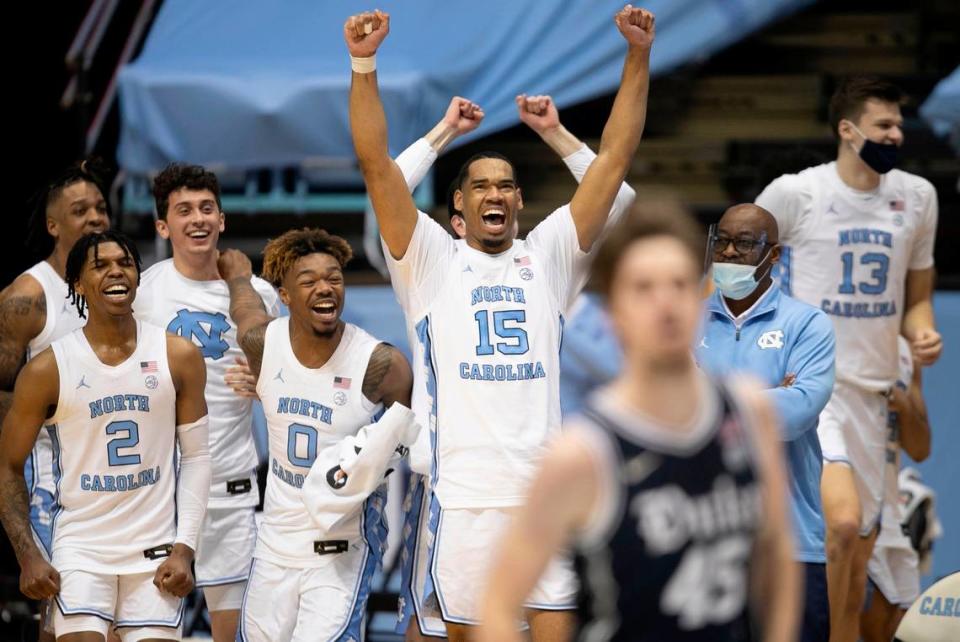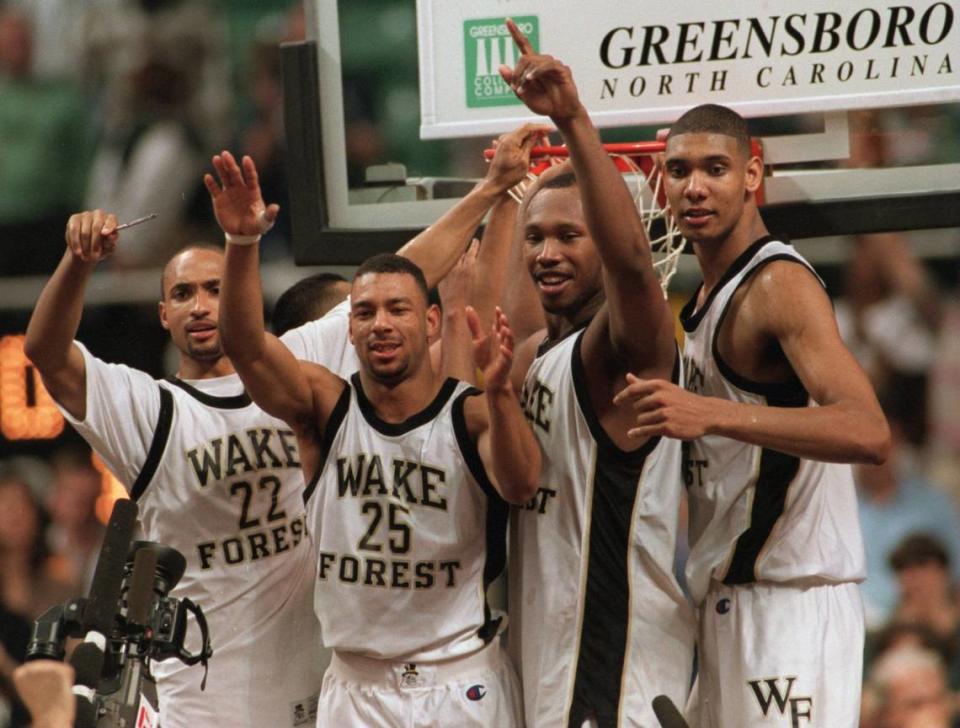The ACC title is up for grabs in Greensboro, perhaps like never before
Most ACC tournaments feel like impending coronations or inevitable clashes of titans. Some years, it feels like the tournament doesn’t even start until Thursday, once the riff-raff has been run off.
It has been a generation since there was a tournament that looked like this week’s, when the combination of a weak top and strong bottom should combine for what the most competitive ACC tournament in decades, and unquestionably the most mysterious since the league expanded to 15 teams.
With 12 teams ranked in the top 100 in adjusted efficiency and only two in the top 25 — as few as the ACC has had in 20 years — it’s going to be a wide-open week in Greensboro, a tournament just about anyone really can win.
“You tend to overdo it sometimes and say that the thing that you’re doing right now is the ‘most ever’ because you’re doing it,” said Duke coach Mike Krzyzewski, who will make his earliest-ever appearance on Tuesday. “But this could be the most open tournament I’ve been a part of in my four decades as an ACC coach.”

If all 15 teams show up in Greensboro — still an if, at this point — it’s fair to say that at least 10 and maybe even 12 of them will go into the tournament believing they have a realistic shot to win it. Florida State and Virginia may be the favorites, but this season has proven they’re not that far ahead of the chasing pack. Everyone from Georgia Tech to Duke thinks they have a shot to win this thing, whether they start Tuesday, Wednesday or Thursday.
There are really only three teams that appear to enter as also-rans: undermanned Miami, rudderless Boston College and overwhelmed Wake Forest. Everyone else has a case to make.
Top seeds vulnerable
What the ACC lacks in strength this year with only three teams likely to be in this week’s AP Top 25, with perennial participants like Duke, Louisville, North Carolina and Syracuse entirely absent, it actually makes up in depth.
Despite the ACC-is-down narrative left over from last season when it actually was, in terms of overall quality this season has been right in the middle, 13th in the 20-year KenPom era, fifth of the eight seasons as a 15-team league. Where it stands out is balance: the gap between top and the back of the pack, from first to 12th, is much smaller than usual.
Compared to the vast majority of ACC seasons, the dominant teams aren’t as dominant. The trailing teams aren’t as far behind. And that’s been proven on the court throughout the season: Virginia lost to N.C. State and Duke; Florida State lost to Notre Dame and North Carolina; Virginia Tech lost to Syracuse and Pittsburgh. Those are your top-three seeds, as vulnerable as they’ve ever been.
The lack of a bona fide national title contender may leave the ACC out of the national conversation, but it certainly amps up the potential drama in Greensboro.
“You look at Virginia and Virginia Tech, those have been the teams that have probably been the most consistent as far as winning, but each of those teams have shown that they’re beatable,” Pittsburgh coach Jeff Capel said. “There have been times in this league where there have been the dominant teams where you knew you were going to have to play your A-plus game and then maybe hope they didn’t play even a B game, because the talent, experience and everything was that much different. This year it’s not that. I do think teams feel like it doesn’t necessarily have to be a Cinderella story, where someone gets hot.”

A lower-seeded team may even have an easier path to the title game, because seeding means very little thanks to the very unbalanced schedule. Conference winning percentage doesn’t necessarily reflect team strength under these conditions, so there may be many bracket “upsets” that aren’t actually such. If it were up to Vegas, North Carolina would be in the top four instead of Virginia Tech.
Pre-expansion vibes
The last tournament this competitive might have been 2004, the last nine-team tournament, also in Greensboro. The ACC was historically strong that year, setting a modern record for overall efficiency that stood until the Big Ten broke it this season. Sixth-seeded Maryland ended up beating Duke in the final and the ACC sent six teams to the NCAA tournament, none worse than a six seed (and Florida State deserved to get in as a seventh).
In the expansion era, Greensboro had similar depth to this season in 2010 but Duke and Maryland were far ahead of the rest of the league and top-seeded Duke won on its way to a national title. Louisville’s ineligibility in Washington in 2016 leveled the playing field somewhat, but North Carolina and Virginia were clear favorites and indeed played for the title in a year the ACC went on to win 19 NCAA tournament games and send two teams to the Final Four.
Deeper in the pre-expansion era, 1995 featured a first-place logjam between Wake Forest, North Carolina, Maryland and Virginia, all ranked in the top 15. All four reached the semifinals in Greensboro, where Wake star Randolph Childress produced the greatest ACC tournament performance of all time, still.

“That was the most anticipated, because we had a four-way tie and everybody was looking forward to it,” former ACC communications director and current tournament historian said Brian Morrison said. “It paid off in dividends.”
Still, more than two-thirds of the conference will have designs on the title this time around. Krzyzewski, who should know, said he thought the last time there was this much uncertainty going into the tournament might be 1983, when N.C. State’s path to the national title started with a string of upsets in Atlanta.
“I thought the league was wide open from the beginning,” Georgia Tech coach Josh Pastner said. “I’ve only been here — this is my fifth year in the league, but talking to other people, it’s maybe as wide open as it’s been in a long time. Even if you just take out the pandemic for a second, it was going to be a wide-open league as it is. I thought there was going to be parity throughout for this one year.”
Pastner famously said last month he thought the ACC should get 11 teams into the NCAA tournament. That isn’t going to happen, but it’s entirely possible a team that’s not on the bubble at this moment could end up grabbing the ACC’s automatic bid and pushing the eventual number up by one.
For the first time in perhaps decades, “Why not us?” is less of a rallying cry and a legitimate question. It’s anyone’s tournament to win in Greensboro.

 Yahoo Movies
Yahoo Movies 
